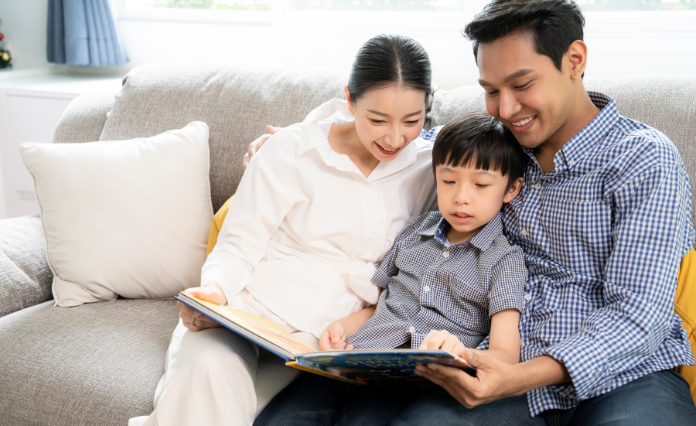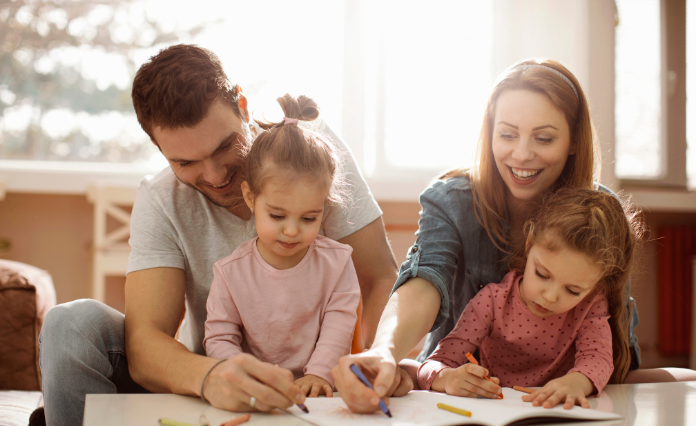Positive Parenting: Creating Calm, Loving Homes for Every Child
- August 15, 2025
- 0
The Heart of Positive Parenting Being a parent is one of the most rewarding and difficult things you can do in life. Every parent wants to raise kids
The Heart of Positive Parenting Being a parent is one of the most rewarding and difficult things you can do in life. Every parent wants to raise kids

Being a parent is one of the most rewarding and difficult things you can do in life. Every parent wants to raise kids who are happy, polite, and strong, but the daily challenges can make it hard to stay calm and patient. Positive parenting is a kind and respectful way to raise children that focuses on connection, empathy, and guidance instead of punishment or fear. It’s not about being the “perfect” parent; it’s about making a calm, loving home where kids can grow emotionally, socially, and mentally.
Respect, understanding, and empathy are the foundations of positive parenting. Positive parenting, on the other hand, focuses on building a strong bond with the child, guiding their behavior through clear communication, and helping them feel responsible and good about themselves.
Decades of research show that kids who grow up with warmth and clear rules are more likely to grow up to be good at solving problems, have good emotional intelligence, and have healthy relationships.
Connection Before Correction is one of the main ideas behind positive parenting: When a child does something wrong, you might want to punish them right away. Positive parenting teaches that building trust and making guidance more effective starts with connecting emotionally through empathy and active listening. A child who feels understood is much more likely to learn from their mistakes.
Making clear and consistent rules: Boundaries are not the opposite of love; they are a necessary part of it. Kids feel safe when they know what they can and can’t do. Positive parenting means setting rules that are the same for everyone and are explained in a kind way.
Showing the behavior you want to see: Kids learn more from what they see than from what you tell them. You need to show your child how to be kind, patient, and respectful by treating them and others that way every day.
Not shaming, but encouraging: Positive parenting doesn’t dwell on mistakes; it celebrates hard work, progress, and learning moments. Encouragement builds self-esteem and resilience, while shaming can make people afraid and lower their self-esteem.
Emotional Security is one of the benefits of positive parenting: Kids who feel loved and respected have a strong sense of their own worth and safety. This emotional base makes them stronger when things get tough.
Better Ways to Talk: Positive parenting encourages kids to talk about their feelings without being afraid of being judged or punished.
Fewer problems with behavior: Kids who are taught with empathy and clear rules are less likely to be defiant, aggressive, or anxious.
A stronger bond between parents and children: Respecting each other and staying in touch with each other builds trust and closeness that lasts into adulthood.
Work on listening actively: When your child talks, pay close attention to what they say. To show that you understand, make eye contact, nod, and repeat what they said.
Say “I” Statements: Instead of saying “You never listen!” say how their actions make you feel, like “I get worried when you run off in the store because I want to keep you safe.”
Give people choices that are limited: Empower children by allowing them to make decisions, like choosing between two healthy snacks or deciding which homework to tackle first.

Teach how to solve problems: Instead of jumping in to fix things, help your child think of ways to solve problems and weigh the pros and cons of each.
Set up routines: Daily routines that are the same every day help kids feel safe and stop fights over power.
Don’t Lose Your Cool During Conflict: Your response affects how they act. Speaking calmly and taking deep breaths is a great way to show how to control your emotions.
Find out what caused it: A lot of the time, bad behavior is a sign that someone needs something, like food, sleep, or attention. First, deal with the root problem.
Redirect, Don’t Punish: If your child is throwing toys, calmly stop them and suggest a safer way to play, like throwing soft balls outside.

Consequences that happen on their own: Let kids see the natural results of what they do, as long as it’s safe. Let them deal with the teacher’s reaction if they forget their homework, for instance.
You can’t fill up a cup that’s empty. It’s not selfish to take care of your own mental, emotional, and physical health; it’s necessary. You can be a better parent when you are calm, well-rested, and in control of your emotions.
When you’re tired, stressed, or dealing with a lot of bad behavior, it can be hard to be a good parent. Keep in mind that it’s a practice, not a goal. It’s okay if some days are harder than others. If you lose your cool, admit it, say you’re sorry, and try again. Your child can also learn a lot from how willing you are to fix mistakes.
Every child should have a place to live where they feel safe, heard, and loved. Positive parenting doesn’t mean not disciplining your kids; it means teaching them with kindness, clarity, and respect. You give your child the best chance for a healthy, happy future by showing them how to be kind, setting clear limits, and focusing on making connections.
The trip might not always go smoothly, but the rewards—a strong bond, mutual respect, and kids who are confident and caring—are worth all the work.
Subscribe Now